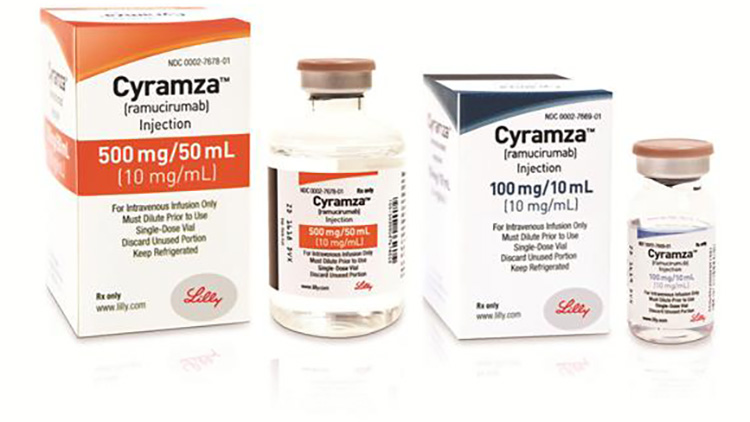Cyramza (ramucirumab) vs Xeloda ()
Cyramza (ramucirumab) vs Xeloda ()
Cyramza (ramucirumab) is a monoclonal antibody used primarily for the treatment of advanced gastric or gastroesophageal junction adenocarcinoma and metastatic non-small cell lung cancer, often in combination with other chemotherapy drugs. Xeloda (capecitabine) is an oral chemotherapy medication that is converted into 5-fluorouracil (5-FU) in the body, commonly used for the treatment of metastatic breast cancer and colorectal cancer. The choice between Cyramza and Xeloda would depend on the specific type and stage of cancer, the patient's overall health, previous treatments, and the potential side effects, which should be discussed with a healthcare provider.
Difference between Cyramza and Xeloda
| Metric | Cyramza (ramucirumab) | Xeloda () |
|---|---|---|
| Generic name | ramucirumab | capecitabine |
| Indications | Gastric cancer, non-small cell lung cancer, colorectal cancer, hepatocellular carcinoma | Metastatic colorectal cancer, metastatic breast cancer, gastric cancer |
| Mechanism of action | Angiogenesis inhibitor; monoclonal antibody targeting VEGFR-2 | Prodrug that is enzymatically converted to 5-fluorouracil (5-FU) in the body |
| Brand names | Cyramza | Xeloda |
| Administrative route | Intravenous infusion | Oral |
| Side effects | Hypertension, diarrhea, headache, hyponatremia | Hand-foot syndrome, diarrhea, nausea, vomiting, fatigue |
| Contraindications | Hypersensitivity to ramucirumab or any component of the formulation | Dihydropyrimidine dehydrogenase (DPD) deficiency |
| Drug class | Monoclonal antibody, angiogenesis inhibitor | Antimetabolite, fluoropyrimidine |
| Manufacturer | Eli Lilly and Company | Hoffmann-La Roche |
Efficacy
Introduction to Cyramza (Ramucirumab) in Colorectal Cancer
Cyramza (ramucirumab) is a monoclonal antibody that targets the vascular endothelial growth factor receptor 2 (VEGFR2), which is implicated in the growth and development of blood vessels that supply tumors with nutrients and oxygen. In the context of metastatic colorectal cancer, ramucirumab has been studied for its efficacy in combination with other chemotherapy agents. The FDA has approved ramucirumab for use in combination with FOLFIRI (irinotecan, folinic acid, and fluorouracil) for the treatment of patients with metastatic colorectal cancer that has progressed on a first-line bevacizumab, oxaliplatin, and a fluoropyrimidine-containing regimen.
Efficacy of Cyramza in Clinical Trials
The approval of Cyramza for metastatic colorectal cancer was largely based on the results of the RAISE trial, a phase III clinical study. In this trial, patients treated with ramucirumab in combination with FOLFIRI demonstrated a statistically significant improvement in overall survival and progression-free survival compared to those receiving FOLFIRI alone. The median overall survival was improved by 1.6 months, and the median progression-free survival was extended by 1.4 months for patients receiving the combination with ramucirumab.
Introduction to Xeloda (Capecitabine) in Colorectal Cancer
Xeloda (capecitabine) is an oral chemotherapeutic agent that is a prodrug of 5-fluorouracil (5-FU), a pyrimidine analog used in the treatment of various cancers, including colorectal cancer. Capecitabine itself is inactive until it is converted to 5-FU in the body, where it interferes with DNA synthesis and inhibits tumor growth. Xeloda is indicated as a first-line treatment for metastatic colorectal cancer when treatment with fluoropyrimidine therapy alone is preferred. It is also used as adjuvant therapy in patients with Dukes' C colon cancer post-surgery.
Efficacy of Xeloda in Clinical Trials
The efficacy of Xeloda in the treatment of colorectal cancer has been demonstrated in several clinical trials. In the metastatic setting, studies have shown that capecitabine is at least as effective as the intravenous formulation of 5-FU/LV (leucovorin) for patients with previously untreated or advanced/metastatic colorectal cancer. In the adjuvant setting, the X-ACT trial showed that capecitabine significantly improved disease-free survival compared to 5-FU/LV in patients with stage III colon cancer. Additionally, it has been associated with a more favorable safety profile, with fewer instances of severe neutropenia and stomatitis, although hand-foot syndrome is more common.
Regulatory Agency Approvals
Cyramza
-
European Medical Agency (EMA), European Union

-
Food and Drug Administration (FDA), USA

-
Health Canada

-
Therapeutic Goods Administration (TGA), Australia

-
Medsafe (NZ)

Xeloda
-
European Medical Agency (EMA), European Union

-
Food and Drug Administration (FDA), USA

Access Cyramza or Xeloda today
If Cyramza or Xeloda are not approved or available in your country (e.g. due to supply issues), you can access them via Everyone.org.
How it works

Make an enquiry
Choose the medicine you want to buy, answer a couple of questions, and upload your prescription to speed things up. We’ll get back to you within 24 hours.


Make an enquiry
Choose the medicine you want to buy, answer a couple of questions, and upload your prescription to speed things up. We’ll get back to you within 24 hours.


Breeze through the paperwork
We'll guide you through the required documents for importing unapproved medicine, ensuring you have all the necessary information.


Get a personalized quote
We’ll prepare a quote for you, including medicine costs and any shipping, administrative, or import fees that may apply.


Receive your medicine
Accept the quote and we’ll handle the rest - sourcing and safely delivering your medicine.

Some text on this page has been automatically generated. Speak to your physician before you start a new treatment or medication.
Let's talk
If you have any questions, call us or send us a message through WhatsApp or email:
Contact us




